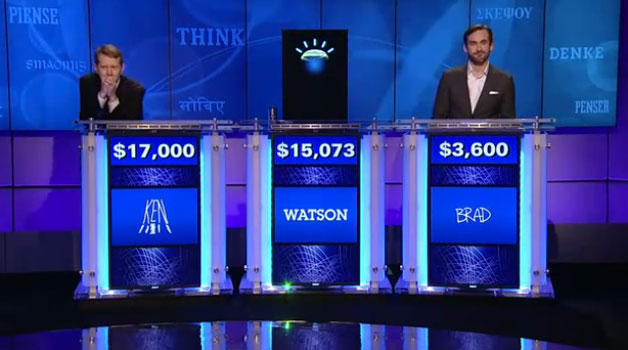He knew pop culture: “What is The Simpsons.” He knew British history: “Who is John Milton.” He knew medicine: “What is narcolepsy.” He knew world languages: “What is ancient Greek.” And though his US geography skills were a little shaky, IBM’s supercomputing trivia machine named Watson easily bested his human opponents at the end of a two-game exhibition series of the quiz show Jeopardy!.
After two games of play, the final score for the series was $77,147 for Watson, $24,000 for Ken Jennings, and $21,600 for Brad Rutter. Ken Jennings and Brad Rutter had both previously mademultimillion-dollar runs on Jeopardy!.
Though Watson had the brain power of thousands of IBM processors and a memory in the terabytes, his key to victory all came down to his unwavering ability to ring-in his answer by physically pressing Jeopardy!‘s buzzer faster than his human opponents. “As Jeopardy devotees know, if you’re trying to win on the show, the buzzer is all,” Ken Jennings said in a live Q&A hosted by the Washington Post. “[Watson] can knock out a microsecond-precise buzz every single time with little or no variation. Human reflexes can’t compete with computer circuits in this regard.”
After the first match which Watson dominated, Jennings and Rutter fought their way back to make the second match exciting to watch. In the second match, it became clear how Watson could be thrown-off when he did not get to be the one choosing the next question. After stringing up an early lead in the second game, Rutter wrestled control from Watson. After that Jennings and Rutter together ran through the categories “Actors Who Direct” and “Also On Your Computer Keys.”
Host Alex Trebek often commented on Watson’s idiosyncratic wagering style on Jeopardy!‘s Daily Double where contestants can wager any amount they choose. “I’ll wager two thousand, one hundred, twenty-seven dollars,” was a typical Watson wager. Guessing “Dorothy Parker,” Watson got that answer wrong. The correct answer was “The Elements of Style.”
The last question of the series was “William Wilkinson’s ‘An Account of the Principalities of Wallachia and Moldavia’ inspired this author’s most famous novel.” Watson had been betting conservatively, but he showed his confidence in a final flourish betting over $17,000. He got that answer — Bram Stoker, the author of Dracula — correct, guaranteeing him victory.
The first-place winner won $1 million. Second and third won $300,000 and $200,000. IBM donated all its winnings to charity, and Jennings and Rutter donated half of their winnings to charities of their choosing.
So what benchmarks are still left to measure the progress of artificial intelligence? Since chess was mastered by computers in the late ’90s, Go — the ancient Chinese board game where opponents place smooth black or white stones on a large board — is the next great challenge in board game artificial intelligence. With its nearly limitless set of possible moves, brute force computing that had allowed computers to master chess are not effective.
But the final measure of computer intelligence is the deceptively simple Turing Test. In the Turing Test, a human judge talks to a machine and a human in a three-way conversation. If the judge cannot tell which of his interlocutors is human, then the computer has passed the test. No computer has come close to passing itself off as a genuine human, and based on Watson’s woody pronunciation, he’s still got a long way to go as well.






